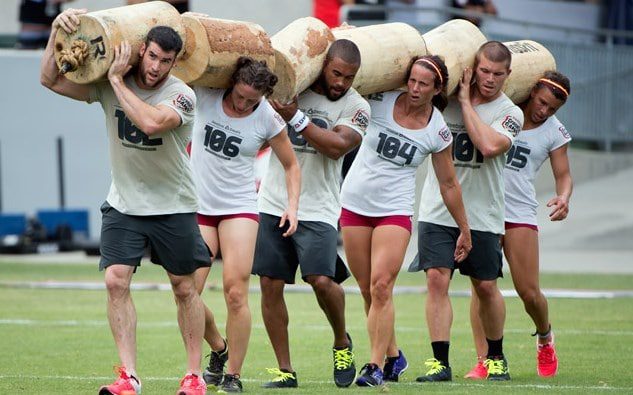No one will argue that physical training, and a lot of it, is the key to being good at CrossFit.
But as most experienced athletes know, the body only goes as as far the mind will let it.
Whether your goal is to make the CrossFit games or simply to lose weight, using mental skills will help you achieve your goals.
Physical training may be the key to progress, but mental training is the key to longevity and clarity, which are necessary components for becoming good at CrossFit.
What mental skills do available to get your mind right? What is mental toughness, and how do you train it?
Training Mental Toughness for CrossFit
Mental toughness is a measure of one’s resilience and confidence in their ability to perform.
Research proves that mental toughness is a key success indicator for sport, work, and life.
The only way to train mental toughness is to put yourself in situations where you are pushed to your limits. Fortunately, CrossFit is a perfect arena for becoming mentally tough.
Being mentally tough is also the result of confidence, which can be developed through having clarity and regular practice.
Resilience and grit, both factors in determining mental toughness, shed light on how far we can go. Without mental toughness, achieving great things is impossible.
Let’s take a look at 7 mental skills you can use in CrossFit and life to set PRs and develop more mental toughness:
1. Anxiety Management

How do you handle adversity?
Pretend it’s the middle of a workout, and you can’t hit a double under to save your life. The guy at your box you consider yourself evenly matched with cruises past you effortlessly.
How do you respond?
Do you rise to the occasion, or do you get discouraged? Do you reset your focus, or does the jump rope get thrown like a rag doll out of frustration?
Anxiety before and during competition is actually necessary for good performance. When managed, it helps activate things like adrenaline.
Managing anxiety is all about having a plan in place for when it arises. Breathing techniques like box breathing and mindfulness allow you to reset your intentions and prevent the anxiety from becoming crippling.
2. Control Your Self-Talk

Self-talk and anxiety go hand in hand, because it’s often what we say to ourselves during a workout that induces anxiety.
Negative self-talk decreases performance during WODs and may discourage an athlete from showing up at all.
You can be competitive and still control what you say to yourself. Consider having a mantra or word you use to shut off the negative dialogue when it starts to get out of control.
The key is to not judge yourself, the words, or the situation. Notice your self-talk, acknowledge it, and if it’s detrimental to performance, change it to something more desirable.
Sounds like:
“Oh you idiot, you can’t get a bar muscle up still! You are so…..”
*Catches self*
“Okay, reset. Let’s ask the coach what I might be doing wrong.”
3. Audit Your Focus.

It’s as true in sport psychology as it is in life; you are what you focus on.
To increase your performance during CrossFit workouts, take a moment to assess yourself. What do you think about before a workout? During? After?
Is your sole focus on getting the top score in that class, or is it on doing your best?
Neither are wrong if they motivate you, but knowing where your focus lies offers valuable information about how you might improve yourself in the future.
For example, if you are solely driven by competition, it makes no sense for an athlete like you to train alone.
You’re also more likely to train hard if you workout in a gym where there are better athletes than you. Otherwise, you’ll become a big fish in a little pond and eventually plateau.
On the other hand, if you’re focused on making friends or reaching a fitness goal for the sake of doing it, you’ll want an environment that focuses on community and keeping each other accountable.
4. Set The Right Goals.

Goal-setting has permeated every corner of the internet, fitness community and otherwise. You may be sick of hearing about it, but it’s still important.
If your goals aren’t aligned to what you want, or you don’t know what you want, you’re bound to get bored or quit. At the very least, you can expect to plateau.
Remember, a good goal is measurable and actionable. You should have an idea of the date you’d like to achieve your goal by.
Tip #3 and #4 go hand in hand, because your focus is a good indicator of what you should build your goals around.
This video with Jordan Peterson on setting goals is a very good place to start.
5. Use Imagery and Visualization.

Another topic that has been abused is visualization. I won’t preach to you that The Secret is the key to success.
Instead, I’ll give you a specific tool for upping your CrossFit performance with imagery.
Like CrossFit tests athletes through diverse physical modalities, the mind has different modalities.
They are visual (see), kinesthetic (feel), and auditory (hear). Each of us has a preferred modality. Knowing yours can help you visualize clearer outcomes for workouts and life.
To find out your modality, ask yourself what turns your motivation on. Is it seeing someone’s performance?
Is it imagining (feeling) what it would feel like to achieve that goal? Is it hearing praise from others for your efforts during today’s WOD?
Whichever one comes to mind first is probably your preferred modality. Use this information to motivate yourself when setting goals before and during training.
6. Train With A Team.

In the same way that a parent will often do more for their kids than they will for themselves, training with a team offers a number of psychological advantages.
You will be more likely to find motivation to work hard through feeling a sense of connectedness and accountability to your teammates.
Rich Froning, 4x CrossFit Games champion, knows the importance of a good team.
In fact, he’s said numerous times, “I would rather have a great team to train with than the perfect training program.”
Even the occasional partner WOD can help you get out of your own head long enough to train hard.
7. Manage Your Time.

How do you organize your life?
Immense psychological benefits are available to anyone willing to stay organized.
In CrossFit, there are numerous examples. Meal prepping instead of cooking every day. Having your gym bag prepared so you don’t have to fumble around at 5am before class.
Making less of these “micro-decisions” throughout the day will help you to stay clear and focused on the big picture.
You’ll have more mental energy to dedicate to PRs, heavy lifts, and crushing CrossFit Metcons.
Conclusion
Physical training is the key to becoming good at CrossFit, but training the mind and becoming more mentally tough will also benefit you.
Mental toughness is a measure of one’s resilience in their efforts to achieve their goals.
Use any or all of these 7 mental skills to increase clarity, set your intentions, and focus on what matters. It will make a world of difference.
Remember, half the battle of reaching your fitness goals is showing up each day. These 7 psychological skills will help you do just that.

